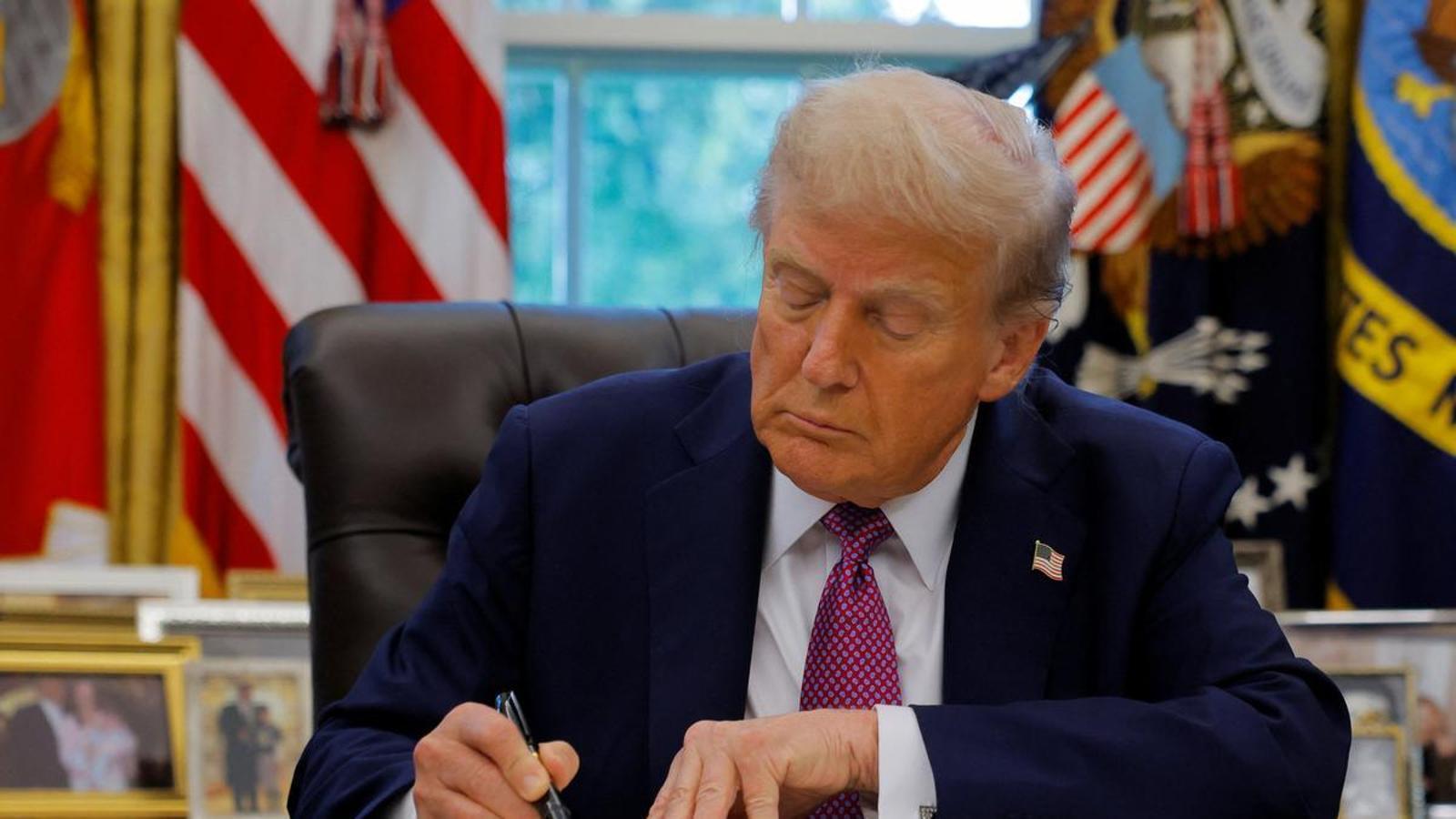Trump changes the name of the Department of Defense to the Department of War
The US president justifies the change because it better represents the values of his government.


WashingtonPush-ups Orwellian of the concepts are accumulating under Donald Trump's administration. The president who claims he deserves the Nobel Peace Prize –and musing that they will never give it to him– has renamed the Department of Defense as the War Department this Friday. The name is in keeping with Trump's new slogan of "Peace through Strength," which is very reminiscent of the statement 1984 "Peace is War." The decision to change, according to the president, is to align the mission of the armed forces by ending the name that has been used since the end of World War II. Trump has been announcing this change for weeks, arguing that the term defense It's too correct and "War Department" sounds better.
"We will raise warriors, not just defenders," said Defense Secretary Pete Hegseth, who was with Trump in the Oval Office when the executive order was signed. The Republican justified the change by recalling "the success" of the bombing of Iran's nuclear facilities. "We won World War I, we won World War II. We won everything before and in between. And then we decided to turn back."woke"And we changed the name to the Department of Defense," Trump said. Although the term didn't exist in the late 1940s when Congress decided to name it the Department of Defense, the president now believes the country has regressed. woke seeds.
Originally, the Department of Defense was the Department of War. It was created by George Washington in 1789 shortly after the Constitution was ratified and he became president. It wasn't until after World War II that the name was changed to the Department of Defense through the National Security Act of 1947. Two years after President Harry Truman signed the act, Congress passed an amendment renaming the National Military Establishment the Department of Defense. Therefore, like so many other executive orders Trump has signed, it's not entirely clear whether the Republican actually has the power to change its name again.
One of the reasons Trump has given these days to justify the name change is to recover the American spirit that won both world wars. "We have an incredible history of winning when it was the War Department," the president said in August, when he first raised the idea. "Defense is too defensive," he added. "And we want to be defensive, but we also want to be offensive if necessary."
Under the name of the War Department, the United States has also experienced the Civil War, and the wars against Spain, England, and the Philippines. The War Department also witnessed the US invasion of Mexico, when they annexed the northern half of the country, including the territories now occupied by California, Texas, and New Mexico. That Trump is now reviving that name, amid the specter of a possible military intervention in Latin America under the pretext of the war on drugs, will surely send shockwaves through Mexico. The secret authorization for the Pentagon to intervene in foreign territory to combat drug trafficking unearthed the imaginary of war with the United States from Mexican memory.
Although Trump promised to withdraw the United States from major international conflicts, his expansionist aspirations regarding Greenland and the Panama Canal point in another direction, as well as the deployment of a flotilla with more than 4,500 marinas at the limits of Venezuela's territorial waters. The new administration seems willing to turn his war on drugs –where he has reclassified certain cartels as terrorist organizations– into a covert pressure tool on Latin American governments to align with his agenda. It's the same scheme he's already been pursuing with tariffs. From economic pressure to military pressure.
Wednesday, after The army killed eleven people who were on board an alleged drug boat. that had left Venezuela, Rubio stated that there would be more attacks like this to combat drug trafficking. This Friday the Pentagon reported that two F-16 fighter jets flew over a US Navy destroyer, the USS Jason Dunham, one of the warships that are part of the flotilla deployed off Venezuelan waters. "Today two military aircraft of the Maduro regime flew near a United States Navy ship in international waters," read a statement, which described the move as "highly provocative."
The White House issued a strong warning in Caracas recommending that the "cartel that runs Venezuela" do nothing to "obstruct, deter, or interfere with counternarcotics and counterterrorism operations carried out by the United States military." Shortly after, it ordered the deployment of ten F-35 fighter jets to an airfield in Puerto Rico to carry out operations against drug cartels, according to sources from the Reuters news agency.
Beyond the legal doubts raised by the executive order, there are also costs. Changes to official names are not cheap, and the label of Department of Defense It's present on hundreds of installations and buildings. Not to mention the seals on documents and publications from all military services. During former President Joe Biden's administration, renaming military installations honoring Civil War-era Confederates cost more than $60 million.
